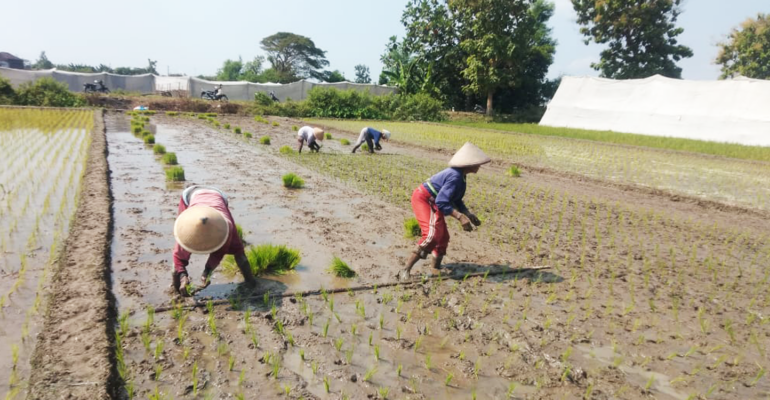IPB University’s Dosen Pulang Kampung Program Enhances Innovation Adoption in Rice Production Centers in Klaten Regency

The Directorate of Agromaritime Community Development (DPMA) at IPB University is once again implementing its program in 2024. The Dosen Pulang Kampung (Dospulkam) program provides an opportunity for lecturers to disseminate the innovations they have developed during their dedication at IPB University by assisting the community in supporting sustainable development.
Dr Ani Kurniawati, a lecturer from the Department of Agronomy and Horticulture at IPB University, is running the program “Enhancing the Adoption of IPB Innovations through the Dissemination of Various IPB Varieties and Prime Cultivation Technologies in the Rice Production Center, Klaten Regency” through the Dospulkam initiative.
The program is located in Karangduren Village, Kebonarum District, Klaten Regency, Central Java. The innovations applied include rice varieties developed by Dr Hajrial Aswidinnoor and his team.
“We collaborate with the Leading Farmers and Fishermen Contact (KTNA) and the local village government to plant various IPB University rice varieties, namely IPB 3S, IPB 9G, IPB 12S, IPB 13S, and IPB 14S, on farmers’ land,” said Dr Ani, the leader of the Dospulkam team.
In addition to Dr Ani, the team consists of Dr Hajrial Aswidinnoor, Candra Budiman, SP, MSi, Dr Heni Purnamawati, and two students, Dian Rahmah Fitri, SP (a master’s student) and Aflah Aditya Ramdani (an undergraduate student).
“IPB 3S and IPB 9G rice varieties have been widely known by the community for some time. Meanwhile, the other rice varieties are new releases in 2023, each possessing different characteristics,” she explained.
Furthermore, she elaborated that the IPB 12S, IPB 13S, and IPB 14S rice varieties have an average yield of about 7.9 – 8.45 tons per hectare of dry milled grain (GKG), which is higher than the IPB 3S variety. However, these varieties still need to be further developed, one of which is through dissemination, to provide tangible results for farmers.
In May 2024, seeds were sent to the KTNA group leader in Kebonarum District, followed by seed sowing and transplanting in June.
“The benefits of adopting this innovation include providing rice farmers with selected varieties to support successful rice production and the application of production technologies that can enhance their production potential. It is hoped that the results of IPB University’s innovations can be widely utilized and support rice development in Indonesia,” concluded Dr Ani. (*/Rz) (IAAS/Aly)



